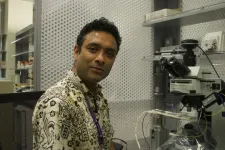New study of Earth's crust shows global growth spurt three billion years ago
2021-01-12
(Press-News.org) Curtin University researchers have used ancient crystals from eroded rocks found in stream sediments in Greenland to successfully test the theory that portions of Earth's ancient crust acted as 'seeds' from which later generations of crust grew.
The findings not only advance an understanding of the production of the Earth's crust through deep time, along with its structure and composition, but reveal a planet-wide crustal growth spurt three billion years ago when mantle temperatures peaked.
Lead author Professor Chris Kirkland, from Curtin University's Timescales of Mineral Systems Group, said the research used the chemistry of old crystals preserved within stream sediments in arctic Greenland to test the idea that portions of ancient crust served as seeds for later growth of continents.
"We found there was a widespread bloom in crust production three billion years ago, during a peak in mantle temperatures," Professor Kirkland said.
"Three-billion-year-old magmas from the mantle had penetrated even more ancient four-billion-year-old crust to create rocks of mixed composition.
"Old crust appeared to be critical in continent production as it acted much like a life raft to preserve crust through later stages of earth history.
"The spike in the age of crust production in Greenland matches other regions across the globe and points to a significant widespread event that formed crust relatively early in the history of our planet."
Professor Kirkland said understanding the production of crust improved the understanding of its structure and composition.
"The Earth's crust hosts concentrations of economically valuable ores and minerals but finding them is becoming increasingly challenging as more near-surface deposits are exhausted," Professor Kirkland said.
"Understanding that later crust is 'seeded' on older pre-existing crust refines our understanding of the generation of where certain metals are hosted and ultimately explains the habitable part of our planet."
INFORMATION:
[Attachments] See images for this press release:

ELSE PRESS RELEASES FROM THIS DATE:
2021-01-12
You are likely familiar with the serious consequences of anorexia for those who experience it, but you might not be aware that the disorder may not be purely psychological. A recent review from researchers at the University of Oxford in the open-access journal END ...
2021-01-12
Highlights:
Severe cases of COVID-19 often include GI symptoms
Chronic diseases associated with severe COVID-19 are also associated with altered gut microbiota
A growing body of evidence suggests poor gut health adversely affects prognosis
If studies do empirically demonstrate a connection between the gut microbiota and COVID-19 severity, then interventions like probiotics or fecal transplants may help patients
Washington, D.C. - January 12, 2021 - People infected with COVID-19 experience a wide range of symptoms and severities, the most commonly reported including high fevers ...
2021-01-12
PHILADELPHIA -- (Jan. 12, 2021) -- Scientists at The Wistar Institute have created an advanced humanized immune system mouse model that allows them to examine resistance to immune checkpoint blockade therapies in melanoma. It has revealed a central role for mast cells. These findings were published today in the journal Nature Communications.
Checkpoint inhibitors revolutionized therapeutic options for advanced melanoma. However, only a fraction of patients respond to this treatment and some relapse due to reemergence of therapy-resistant lesions.
"To better understand why some cancers do not respond or become resistant to checkpoint therapies, ...
2021-01-12
Imagine you gave the exact same art pieces to two different groups of people and asked them to curate an art show. The art is radical and new. The groups never speak with one another, and they organize and plan all the installations independently. On opening night, imagine your surprise when the two art shows are nearly identical. How did these groups categorize and organize all the art the same way when they never spoke with one another?
The dominant hypothesis is that people are born with categories already in their brains, but a study from the Network Dynamics Group (NDG) at the Annenberg School for Communication has discovered a novel explanation. In an experiment in which people were asked to categorize unfamiliar shapes, individuals and small groups created ...
2021-01-12
New research has found as climate change causes the world's oceans to warm, baby sharks are born smaller, exhausted, undernourished and into environments that are already difficult for them to survive in.
Lead author of the study Carolyn Wheeler is a PhD candidate at the ARC Centre of Excellence for Coral Reef Studies at James Cook University (Coral CoE at JCU) and the University of Massachusetts. She examined the effects of increased temperatures on the growth, development and physiological performance of epaulette sharks--an egg-laying species found only ...
2021-01-12
COLUMBUS, Ohio - An unfortunate truth about the use of mechanical ventilation to save the lives of patients in respiratory distress is that the pressure used to inflate the lungs is likely to cause further lung damage.
In a new study, scientists identified a molecule that is produced by immune cells during mechanical ventilation to try to decrease inflammation, but isn't able to completely prevent ventilator-induced injury to the lungs.
The team is working on exploiting that natural process in pursuit of a therapy that could lower the chances for lung damage in patients on ventilators. Delivering high levels of the helpful molecule with a nanoparticle was effective ...
2021-01-12
Abu Dhabi, United Arab Emirates, January 12, 2020: New research from NYU Abu Dhabi's Laboratory of Neural Systems and Behavior for the first time used an animal model to demonstrate how abnormal sleep architecture can be a predictor of stress vulnerability. These important findings have the potential to inform the development of sleep tests that can help identify who may be susceptible -- or resilient -- to future stress.
In the study, Abnormal Sleep Signals Vulnerability to Chronic Social Defeat Stress, which appears in the journal Frontiers in Neuroscience, NYUAD Assistant Professor of Biology Dipesh Chaudhury and Research Associate Basma Radwan describe their development of a mouse ...
2021-01-12
ORLANDO, Fla. -- A new national survey by the Orlando Health Heart & Vascular Institute finds many Americans would delay doctor's appointments and even emergency care when COVID-19 rates are high. The survey found 67 percent of Americans are more concerned about going to medical appointments when COVID-19 rates are high in their area and nearly three in five (57 percent) are hesitant to go to the hospital even for an emergency.
In a time when every trip out of the house and every person we come in contact with poses a threat of contracting COVID-19, ...
2021-01-12
WASHINGTON - Computer-based artificial intelligence can function more like human intelligence when programmed to use a much faster technique for learning new objects, say two neuroscientists who designed such a model that was designed to mirror human visual learning.
In the journal Frontiers in Computational Neuroscience, Maximilian Riesenhuber, PhD, professor of neuroscience, at Georgetown University Medical Center, and Joshua Rule, PhD, a postdoctoral scholar at UC Berkeley, explain how the new approach vastly improves the ability of AI software to quickly learn new visual ...
2021-01-12
The Korea Institute of Science and Technology (KIST) has announced that the research team led by Dr. Kim Kyoung-Whan at the Center for Spintronics has proposed a new principle about spin memory devices, which are next-generation memory devices. This breakthrough presents new applicability that is different from the existing paradigm.
Conventional memory devices are classified into volatile memories, such as RAM, that can read and write data quickly, and non-volatile memories, such as hard-disk, on which data are maintained even when the power is off. In recent years, related academic and industrial fields have been combining their advantages to accelerate the development of next-generation memory that is fast and capable of maintaining data even when the power is off.
A spin memory ...
LAST 30 PRESS RELEASES:
[Press-News.org] New study of Earth's crust shows global growth spurt three billion years ago



